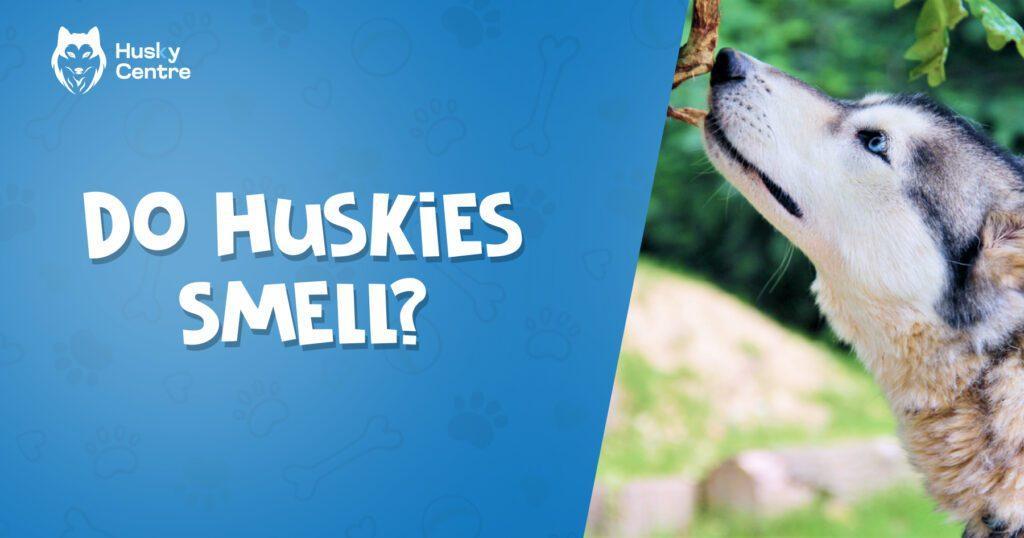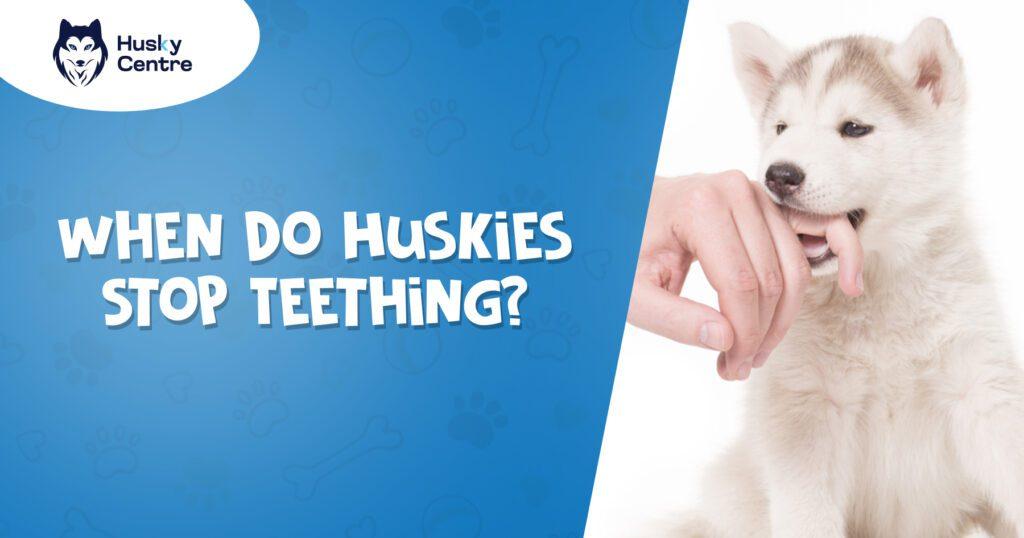No, Huskies do not typically have a strong odor. They are known for being relatively odorless dogs.
Huskies are highly popular breeds known for their striking appearance and energetic personality. Their thick double-coat helps them adapt to extreme cold temperatures, but it also raises questions about their smell.
Thankfully, Huskies are not particularly smelly dogs. Unlike some other breeds, Huskies have low oil levels in their skin, which leads to less odor.
However, it’s important to remember that all dogs have a natural scent, and proper grooming and hygiene are still necessary to maintain their cleanliness. We will explore more about why Huskies don’t typically have a strong smell and provide tips on keeping them smelling fresh.
Why Do Huskies Smell More Than Other Breeds?
Huskies are known for their beautiful fur coats and striking appearance. However, one common complaint among husky owners is their strong odor. If you own a husky or are considering getting one, you may be wondering why huskies tend to smell more than other dog breeds.
In this article, we will explore the reasons behind this issue and provide some insights into how you can manage and minimize husky odor.
Hair Density And Shedding
Huskies have a dense double coat that serves as insulation, keeping them warm in winter and cool in summer. This double layer consists of a soft undercoat and a coarser protective topcoat.
While this coat is vital for huskies in harsh weather conditions, it also contributes to their smell. The dense hair traps dirt, debris, and even saliva, leading to a noticeable odor.
Huskies are notorious shedders. They have a continuous cycle of shedding and regrowing their fur, which results in loose hair all around the house.
Shedding not only adds to the odor but also creates an environment for bacteria and fungi to thrive, causing further unpleasant smells.
Natural Oils In Their Fur
Another reason why huskies smell more than other breeds is the presence of natural oils in their fur. These oils act as a protective barrier for their skin, keeping it moisturized and preventing it from drying out.
However, when these oils mix with sweat, dirt, and other external elements, it can produce a distinct odor.
Huskies have a unique metabolism that produces more natural oils than many other breeds. As a result, their fur tends to retain and produce more odor compared to other breeds with different coat types.
Regular grooming and bathing can help reduce the buildup of oils and keep your husky smelling fresh.
Wet Dog Smell
Like all dogs, huskies can develop a wet dog smell when their fur gets wet. This smell can be quite strong and unpleasant, especially if the wet fur is not dried properly.
Huskies have a dense coat that takes longer to dry, making them more prone to that wet dog smell. It’s essential to thoroughly dry your husky after baths or rainy outings to prevent this odor from lingering.
To combat the wet dog smell, consider using a specially formulated dog shampoo that neutralizes odors and leaves a pleasant scent. Additionally, towel drying your husky followed by using a blow dryer on a low heat setting can help ensure their fur is completely dry.
Understanding why huskies smell more than other breeds can help you address and manage this issue effectively. Proper grooming, regular bathing, and maintaining their coat’s cleanliness are key steps to minimize odor.
By following these tips, you can ensure that your husky remains fresh and pleasant-smelling, even with their natural predisposition to odor.
Understanding The Causes Of Odor In Huskies
Huskies are beautiful and energetic dogs known for their striking appearance. However, one common concern among husky owners is their distinctive smell. While all dogs have a natural scent, huskies can sometimes develop more noticeable odors.
To address this issue, it is crucial to understand the underlying causes that contribute to the odor. By identifying the root causes, owners can take appropriate steps to ensure their huskies remain fresh and clean.
Bacterial And Yeast Infections
Bacterial and yeast infections are one of the leading causes of unpleasant odors in huskies. These infections are often triggered by a combination of factors such as excessive moisture, poor grooming, or an unbalanced diet. When the husky’s skin becomes susceptible to these types of infections, it can result in a pungent smell.
It’s essential for husky owners to closely monitor their pet’s skin health. Regularly check for any signs of redness, inflammation, or excessive scratching, as these can indicate a possible infection. If you notice these symptoms, consult with a veterinarian to determine the appropriate course of treatment.
Poor Dental Hygiene
Dental hygiene plays a significant role in a husky’s overall odor. Just like humans, dogs can develop plaque, tartar, and gum disease if proper oral care is not maintained. The accumulation of bacteria in the mouth can contribute to bad breath, which can ultimately lead to a lingering odor around the husky.
To prevent dental issues and associated odors in huskies, regular brushing of their teeth is highly recommended. Furthermore, providing chew toys and dental treats can help reduce plaque build-up and promote better oral health. Incorporating these practices into your husky’s routine can help keep their breath fresh and their overall smell more pleasant.
Anal Gland Issues
Huskies, like many other dog breeds, have anal glands located on either side of their rectum. These glands secrete a scent that helps them communicate with other dogs. However, if these glands become impacted or infected, they can cause a distinct and unpleasant odor.
Keeping these glands healthy and clean is crucial in preventing odor issues. Regularly check for signs of discomfort, excessive scooting, or foul-smelling discharge around the anal area. If you observe any of these signs, it may be necessary to consult a veterinarian, who can express the anal glands to alleviate the problem and prevent further complications.
In conclusion, huskies can sometimes develop noticeable odors, but understanding the underlying causes is the key to successfully managing and mitigating them. By addressing issues such as bacterial and yeast infections, poor dental hygiene, and anal gland problems, husky owners can ensure their furry companions remain fresh and odor-free. Remember, a clean and healthy husky is a happy husky!
How To Identify If Your Husky Has An Odor Problem
One common concern among husky owners is the smell associated with their furry companions. While huskies are known for their beautiful coats and playful personalities, they can sometimes have an unpleasant odor.
If you’ve noticed that your husky’s scent seems to linger, or if you’ve observed other signs of a potential odor problem, it’s important to address the issue promptly. In this article, we’ll explore how to identify if your husky has an odor problem.
Persistent Smell Even After Bathing
If you’ve recently given your husky a bath and notice that the unpleasant odor persists, it could be a sign of an underlying odor problem. While clean dogs may still have a slight smell, an unusually strong or lingering odor could indicate something more.
To determine if your husky has an odor issue despite regular bathing, consider the following:
- Observe your husky’s coat – Does it feel greasy or look dull? A lackluster coat can often be a sign of skin issues leading to odor.
- Check for redness or inflammation – Skin irritations, such as allergies or dermatitis, can cause odor in huskies. Look for signs of redness, rashes, or hot spots.
- Inspect the ears – A strong smell emanating from your husky’s ears can indicate an infection. Look for discharge, redness, or excessive scratching in the ear area.
By paying attention to these factors after bathing, you can determine if your husky’s persistent smell is a cause for concern.
Excessive Scratching Or Licking
Huskies, like all dogs, need to groom themselves. However, if you notice that your husky is scratching or licking excessively, it could be a sign of an underlying issue contributing to the odor problem. Here are a few things to consider:
- Look for dry or flaky skin – If your husky’s skin appears dry, flaky, or irritated, it may be the reason for their excessive scratching and subsequent odor.
- Check for external parasites – Fleas, ticks, or mites can cause discomfort and lead to excessive scratching. Inspect your husky’s coat for any signs of these pesky critters.
- Consider allergies – Like humans, dogs can develop allergies. If your husky’s scratching is accompanied by red, inflamed skin or hair loss, allergies may be the culprit.
By identifying the underlying cause of your husky’s excessive scratching or licking, you can address the issue and help alleviate the associated odor.
Unpleasant Breath
While it’s no secret that dogs’ breath can sometimes be less than fresh, an overwhelmingly foul odor from your husky’s mouth can be an indicator of a more serious problem. To determine if your husky’s breath is cause for concern, consider the following:
- Inspect the teeth and gums – Dental issues, such as gum disease or tooth decay, can lead to bad breath. Look for signs of redness, swollen gums, or tartar buildup.
- Consider gastrointestinal issues – Certain digestive problems can contribute to foul-smelling breath in dogs. If your husky has an upset stomach or other signs of digestive distress, it may be the reason for their unpleasant breath.
- Watch for excessive drooling – Excessive drooling accompanied by bad breath can indicate an underlying health issue that requires veterinary attention.
If your husky’s breath seems unusually unpleasant, it’s crucial to address the issue to ensure their overall health and well-being.
10 Effective Ways To Eliminate Odor In Huskies
Huskies are known for their gorgeous appearance and playful nature. However, it’s no secret that these beautiful dogs can sometimes have an overpowering odor.
If you’re a husky owner, you know the struggle of keeping your furry friend smelling fresh. Luckily, there are several effective ways to tackle the odor and ensure your husky remains a pleasant companion.
1. Regular Grooming And Brushing
Grooming and brushing your husky regularly is crucial in minimizing odor. Not only does it keep their coat clean and free from excess hair, but it also helps distribute natural oils evenly.
Regular brushing eliminates loose hair and prevents tangles, which can trap dirt and cause unpleasant smells to linger.
2. Bathing With Odor-neutralizing Shampoos
When it comes to bathing your husky, choosing the right shampoo is essential. Look for odor-neutralizing shampoos specifically designed for dogs. These shampoos not only cleanse your husky’s coat but also target and eliminate the underlying causes of the smell.
Remember to rinse thoroughly to avoid any product residue that might exacerbate the odor.
3. Cleaning Ears And Teeth Regularly
Many huskies have a strong odor emanating from their ears and mouth. Regularly cleaning your husky’s ears and teeth is essential to combat this.
Use a veterinarian-approved ear cleaner and a soft cotton ball to gently clean the ears. Likewise, brush your husky’s teeth with a dog-specific toothbrush and toothpaste to prevent plaque buildup and bad breath.
4. Ensuring A Healthy Diet
A well-balanced and healthy diet can work wonders in reducing odor in huskies. Ensure your husky is receiving a high-quality dog food that meets their nutritional needs.
Avoid feeding them table scraps or low-quality treats, as these can lead to digestive issues and contribute to unpleasant odors.
5. Using Odor-neutralizing Sprays And Powders
Odor-neutralizing sprays and powders can provide quick relief from husky smells. Look for products specifically formulated for dogs and spray lightly on your husky’s coat, avoiding their eyes and mouth.
These products work by neutralizing odors rather than masking them, providing long-lasting freshness.
6. Washing Bedding And Toys Regularly
Bedding and toys can accumulate odor over time, and cleaning them regularly is crucial. Wash your husky’s bedding in hot water with a pet-friendly detergent to eliminate any bacteria or odor-causing agents. Additionally, clean their toys by soaking them in a solution of water and pet-friendly disinfectant.
7. Cleaning Living Areas And Eliminating Odor Sources
Huskies often leave traces of their scent in their living areas. Regularly clean and disinfect these areas to eliminate any lingering odor sources.
Vacuum carpets, mop floors, and wipe down surfaces with a pet-safe cleaner. This not only removes odor but also prevents the buildup of allergens and bacteria.
8. Maintaining Good Hygiene Practices
Maintaining good hygiene practices can significantly contribute to reducing husky odor. Trim your husky’s nails regularly to prevent dirt and odor from accumulating.
Keep their paws clean by wiping them after walks with a damp cloth. Regularly check for and clean any debris stuck between their paw pads.
9. Addressing Underlying Health Issues
If your husky’s odor persists despite regular grooming and hygiene practices, it might be an indication of an underlying health issue. Conditions like skin infections, yeast overgrowth, or dental problems can contribute to foul smells. Consult with a veterinarian to identify and address any potential health concerns.
10. Seeking Professional Help If Necessary
If all else fails and your husky’s odor remains stubborn, it’s essential to seek professional help. Professional dog groomers can offer specialized treatments to eliminate odor and provide personalized advice on maintaining your husky’s hygiene.
Frequently Asked Questions On Do Huskies Smell
Do Huskies Have A Strong Smell?
Huskies have a distinct odor, which is natural and part of their breed. However, with proper grooming and regular baths, you can manage their smell effectively.
Regular brushing helps remove loose hair and dirt, while high-quality dog shampoos can minimize odor and keep your husky smelling fresh.
Can Huskies Be Odorless?
While no dog is truly odorless, huskies are known for having less of a dog smell compared to other breeds. Their clean and dense double coat helps minimize odor, as it protects their skin from dirt and debris.
However, it’s essential to maintain good hygiene practices and regularly groom your husky to keep them smelling fresh.
How Often Should I Bathe My Husky?
Huskies have a self-cleaning nature, and excessive bathing can strip their coat of natural oils. Aim to bathe your husky every three to four months, or as needed. Regular brushing and grooming can help keep their coat clean and minimize odor between baths.
Consult with your veterinarian for personalized recommendations based on your husky’s activity level and specific needs.
Why Does My Husky Smell Bad Even After A Bath?
Bathing your husky too frequently can disrupt their natural oil balance, leading to a stronger odor. Additionally, if your husky has skin issues, such as allergies or infections, it can contribute to a persistent smell even after bathing. Ensure you are using a proper dog shampoo, thoroughly rinsing your husky, and addressing any underlying skin problems with the guidance of a veterinarian.
Conclusion
To sum up, while huskies may have a reputation for having a unique odor, proper grooming and hygiene practices can help minimize any unpleasant smells. Regular bathing, brushing, and keeping their living areas clean are key factors in keeping your husky smelling fresh.
Remember, each husky is different, so it’s important to observe your pet’s individual needs and consult with a veterinarian if necessary. By taking these steps, you can enjoy the companionship of your husky without any odor concerns.


Meet Jarred, the heart and soul behind HukyCentre. With a deep affection for furry friends, he pours his passion into every word he writes. His genuine love for dogs shines through in his engaging and informative content. As a dedicated dog enthusiast, Jarred’s goal is to share valuable insights and tips that resonate with fellow dog lovers. Join Jarred on the journey as he celebrates the joy and companionship that dogs bring into our lives.



